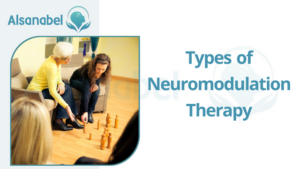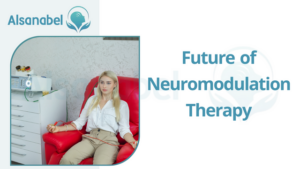The Role of Neuromodulation therapy in Qatar 2024
- Category Mental health Qatar
What is Neuromodulation Therapy?
Neuromodulation therapy in Qatar is a medical approach that utilizes neurostimulators to deliver controlled electrical impulses to specific nerves or regions of the brain. This therapy aims to modulate abnormal neural activity and restore normal functioning. By targeting specific areas, neuromodulation therapy can help alleviate chronic pain, improve motor control, and manage neurological disorders.
It offers a non-invasive or minimally invasive alternative to traditional treatment methods, providing patients with long-term relief and improved quality of life. With ongoing advancements in technology and scientific research, neuromodulation therapy continues to evolve and expand its potential applications in the field of healthcare.
Benefits of Neuromodulation Therapy
- Provides long-term relief from chronic pain
- Improves motor control and function in movement disorders
- Reduces the need for medication and its associated side effects
- Enhances quality of life by improving overall physical and mental well-being
- Offers a non-invasive or minimally invasive treatment option for patients
- Customizable therapy that can be adjusted to individual needs and preferences
- Helps manage neurological conditions such as Parkinson’s disease, epilepsy, and multiple sclerosis
- Increases treatment options for patients who have not responded well to traditional therapies.
Types of Neuromodulation Therapy
Neuromodulation therapy in Qatar encompasses various treatment methods that target the nervous system to alleviate symptoms and improve overall well-being. Two common types of neuromodulation therapy are Spinal Cord Stimulation (SCS) and Deep Brain Stimulation (DBS). SCS involves the use of an implanted device that delivers electrical impulses to the spinal cord, helping to manage chronic pain conditions.

DBS, on the other hand, utilizes electrodes placed deep within the brain to regulate abnormal brain activity and treat conditions such as Parkinson’s disease, essential tremor, and dystonia. Both therapies have shown promising results in providing relief and improving quality of life for patients.
Spinal Cord Stimulation (SCS)
Spinal Cord Stimulation (SCS) is a type of neuromodulation therapy that involves the use of an implanted device to deliver electrical impulses to the spinal cord. It is primarily used for managing chronic pain conditions that have not responded to other treatments.
The SCS device consists of leads placed near the spinal cord, which send electrical signals to block or mask pain signals before they reach the brain, providing relief for individuals suffering from conditions such as failed back surgery syndrome, neuropathy, and complex regional pain syndrome. SCS has shown promising results in improving pain levels and enhancing overall quality of life for patients.
Deep Brain Stimulation (DBS)
Deep Brain Stimulation (DBS) is a type of neuromodulation therapy that involves the implantation of electrodes deep within the brain to deliver electrical impulses. DBS has been proven effective in treating various neurological disorders, including Parkinson’s disease, essential tremor, and dystonia.
It works by modulating abnormal brain activity, reducing symptoms and improving motor function. DBS has shown promising results in improving patients’ quality of life and reducing the need for medication. In Qatar mental hospital, DBS is available at specialized medical centers where experienced neurosurgeons and neurologists work together to provide this advanced therapeutic option to patients.
Applications of Neuromodulation Therapy
Neuromodulation therapy has a wide range of applications in the field of healthcare. One of its key applications is in chronic pain management, where it can provide relief for individuals suffering from conditions such as neuropathic pain or failed back surgery syndrome. Additionally, neuromodulation therapy in Qatar has been effective in the treatment of various neurological disorders, including Parkinson’s disease, essential tremor, and dystonia.
This advanced therapy has also shown promising results in the management of mental health conditions such as depression and obsessive-compulsive disorder (OCD). Overall, neuromodulation therapy offers new possibilities for improving the quality of life for patients with debilitating conditions.
Chronic Pain Management
Neuromodulation therapy has revolutionized the field of chronic pain management, providing a non-pharmacological alternative for individuals suffering from persistent and debilitating pain. Through techniques such as spinal cord stimulation (SCS), electrical impulses are delivered to the spinal cord, modulating the transmission of pain signals and providing relief.
This therapy has shown remarkable success in treating conditions such as neuropathic pain, failed back surgery syndrome, and complex regional pain syndrome. With its ability to target specific areas and tailor treatment to individual needs, neuromodulation therapy offers a new hope for patients seeking long-term relief from chronic pain with Psychiatrist in Qatar.
Treatment of Neurological Disorders
Neuromodulation therapy is also used in the treatment of various neurological disorders in Qatar. These include conditions such as epilepsy, Parkinson’s disease, and dystonia. Through techniques like deep brain stimulation (DBS), electrical impulses are delivered to specific areas of the brain to regulate abnormal neural activity and alleviate symptoms.
This therapy has shown promising results in improving motor control, reducing tremors, and enhancing overall quality of life for individuals with these neurological disorders. With ongoing advancements and research in the field, neuromodulation therapy continues to expand its potential applications in Psychiatric in Qatar.
Effectiveness and Safety
Neuromodulation therapy has shown significant effectiveness in managing chronic pain and treating neurological disorders. Clinical studies have demonstrated the reduction of pain intensity and improved quality of life in patients undergoing spinal cord stimulation (SCS) or deep brain stimulation (DBS).

Furthermore, the safety profile of neuromodulation therapy is generally favorable, with minimal adverse effects reported. However, as with any medical procedure, there are potential risks such as infection, device malfunction, or unintended side effects. It is important for healthcare professionals to carefully evaluate each patient’s condition and conduct thorough risk-benefit analysis before recommending Neuromodulation therapy in Qatar.
Clinical Studies and Research Findings
Clinical studies and research have consistently shown the effectiveness of Neuromodulation therapy in Qatar in managing chronic pain and treating neurological disorders. Numerous trials have demonstrated significant reductions in pain intensity and improvements in quality of life for patients undergoing spinal cord stimulation (SCS) or deep brain stimulation (DBS).
These findings provide strong evidence for the use of neuromodulation therapy as a viable treatment option. Moreover, ongoing research continues to explore new applications and refine techniques to further enhance the efficacy of this therapeutic approach.
Potential Risks and Side Effects
- Like any medical procedure, neuromodulation therapy carries some potential risks and side effects.
- In rare cases, patients may experience infection, bleeding, or discomfort at the implantation site.
- There is a small risk of device failure or malfunction, which may require reoperation or replacement.
- Some individuals may also encounter undesirable physical sensations or movement-related side effects.
- It is crucial for patients to discuss these potential risks and side effects with their healthcare provider before undergoing neuromodulation therapy to ensure they are fully informed and can make an educated decision.
Neuromodulation Devices
Neuromodulation devices are implantable devices that deliver electrical stimulation to specific areas of the brain or spinal cord. These devices are designed to help manage chronic pain and neurological disorders such as Parkinson’s disease, epilepsy, and obsessive-compulsive disorder.
They consist of a neurostimulator, which generates the electrical impulses, and leads or electrodes that deliver the impulses to the targeted area. The neurostimulator can be programmed and adjusted by a Psychiatrist in Qatar to customize treatment for each individual patient. Implantation procedures are typically minimally invasive, and regular maintenance is required to ensure optimal functioning of the device.
Overview of Different Neurostimulators
- Spinal Cord Stimulation (SCS): This neurostimulator is used to manage chronic pain by delivering electrical impulses to the spinal cord, blocking pain signals from reaching the brain.
- Deep Brain Stimulation (DBS): DBS is commonly used for neurological disorders such as Parkinson’s disease. It involves implanting a neurostimulator in the brain, which can be programmed to regulate abnormal brain activity and improve symptoms.
- Vagus Nerve Stimulation (VNS): VNS is used for epilepsy and treatment-resistant depression. The neurostimulator is implanted near the vagus nerve and delivers electrical stimulation to the brain through this nerve.
- Sacral Nerve Stimulation (SNS): SNS treats conditions like urinary incontinence and fecal incontinence by delivering mild electrical impulses to the sacral nerves that control bowel and bladder function.
Each of these neurostimulators has specific benefits and applications, and their choice depends on the individual’s condition and treatment goals.
Implantation Procedure and Maintenance
Implantation procedure for neurostimulators involves a surgical procedure where the device is implanted under the skin. The specific placement depends on the targeted nerves or areas in the body. Maintenance of neurostimulation devices includes regular check-ups with Psychiatrist in Qatar to ensure proper functioning and accurate programming.
Battery replacements are required periodically, which can be done through a minor surgical procedure. Some devices also allow for remote programming adjustments through handheld controllers. It is crucial for patients to follow post-implantation care instructions provided by their healthcare providers to ensure optimal results and longevity of the device.
Future of Neuromodulation Therapy
The future of Neuromodulation therapy in Qatar holds promising advancements and potential applications. Ongoing research and development aim to improve the effectiveness and usability of neurostimulation devices. Emerging trends include miniaturization of devices, allowing for more discreet implantation procedures.

Additionally, there is a growing interest in using neuromodulation therapy for Mental health Qatar, such as depression and anxiety disorders. Furthermore, technological innovations such as closed-loop systems that adapt stimulation based on real-time feedback from the body are being explored. These advancements have the potential to revolutionize the way we treat various neurological and psychiatric disorders in Qatar.
Emerging Trends and Advancements
Emerging trends in Neuromodulation therapy in Qatar are paving the way for significant advancements in the field. One such trend is the miniaturization of neurostimulation devices, allowing for more discreet implantation procedures and improved patient comfort.
Additionally, there is a growing interest in using neuromodulation therapy for mental health conditions such as depression and anxiety disorders. Technological innovations, such as closed-loop systems that adapt stimulation based on real-time feedback from the body, are also being explored. These advancements hold promise for revolutionizing the treatment of various neurological and psychiatric in Qatar.
Potential Applications and Innovations
Neuromodulation therapy holds immense potential for various applications and innovations in Qatar. One potential application is the treatment of mental health conditions, such as depression, anxiety disorders, and post-traumatic stress disorder (PTSD). With the increasing recognition of the impact of mental health on overall well-being, neuromodulation therapy can provide a valuable alternative or adjunct to traditional psychiatric treatments.
Additionally, advancements in closed-loop systems offer the possibility of tailored stimulation based on real-time feedback from the patient’s body, improving treatment outcomes. These potential applications and innovations signify a promising future for neuromodulation therapy in Qatar.









